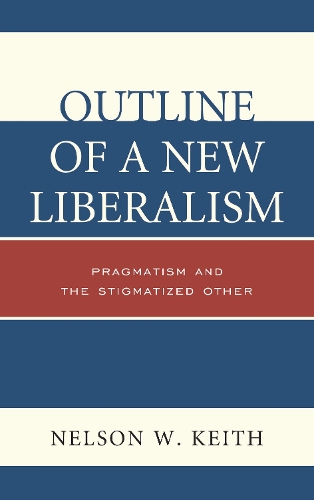
Outline of a New Liberalism: Pragmatism and the Stigmatized Other
(Hardback)
Publishing Details
Outline of a New Liberalism: Pragmatism and the Stigmatized Other
By (Author) Nelson W. Keith
Bloomsbury Publishing PLC
Lexington Books
29th July 2015
United States
Classifications
Professional and Scholarly
Non Fiction
Central / national / federal government policies
Social and political philosophy
Cultural studies
320.51
Physical Properties
Hardback
270
Width 162mm, Height 236mm, Spine 23mm
531g
Description
This book is revolutionary in intent, and is in many ways quite an uncommon work. It is iconoclastic, as it goes about dislodging roots. It attempts to release the stigmatized Other from entrapment by rationalism and modern liberalism. The stigmatized Other are legendarily marginalized from congenial social relations with mainstream society. They include peoples of color, women, gays and lesbians, among others. Entrapment through misrecognition is captured via marked contrasts existing between two major liberal configurations: modern liberalism and pragmatism. Accordingly the book is tasked with overcoming the systemic constraints placed upon the stigmatized Other to conform when such a demand runs disastrously counter to their inherently irrefragable self-definition. Conformity is reductionist, beholden to dyadic forms of thinking which impose a singular, mathematically-derived Gods Eye View upon reality. The difficulty here is that the imposed criteria for giving meaning, value and purpose to human life, have no place for what the stigmatized Other adopts. On the other hand, pragmatism of a particular stripe establishes a naturalistic, instead of the mathematical basis, for our understanding of human life. Naturalism counsels that human beings should situate themselves directly in the midst of what constitutes their sense of life, with experience providing the bases for all the related determinations. Experience draws upon conditions of flux and uncertainty as the basis of human life. To adhere to the Gods Eye View is to make human beings into desiccated calculating machines. This book is located in the heart of this tension. Programmatically, it deconstructs the rationalism/modern liberalism combine, and constructs its replacement in pragmatism complemented by phronesis, as carriers of this alternative mode of thought. Consequential change emerges: a modern liberal world of fixity in social relations, mathematically-derived is displaced by one characterized by intersubjective relations, where lived experience forms its scientific and philosophical bases. The Ancients figure prominently in this book, as it is shaped around the central idea that the emancipation of the stigmatized Other is occurring in the context of perhaps the first engagement between the Platonic and the Protagorean (Sophistic) confrontation which lies at the heart of early Greek thought.
Reviews
Nelson Keiths Outline of a New Liberalism is a must-read for anyone interested in social justice, pragmatism, contemporary political philosophy, or critical philosophy of race. . . .Focusing more specifically on how the political landscape and the political life of the US have been shaped by the combination of modern rational-liberalism and racism, Keith offers compelling arguments about how modern rational-liberalism has been complicit with racial injustices and how a pragmatist-phronetic pragmatism can address those injustices. . . . .Keiths engaging and provocative book nicely sets the agenda for contemporary pragmatist discussions of social justice. * William James Studies *
This remarkable book argues vigorously for the relevance, or even necessity, of pragmatism in political thought. A move from mainstream modern liberalism to pragmatist social and political philosophy, based on William James's and John Dewey's ideas in particular, is vital insofar as we are committed to hearing the voice, and to recognizing the experiences, of the 'stigmatized Other.' -- Sami Pihlstrm, University of Helsinki
As we find today more Blacks and peoples of color embracing Pragmatism, many are left wondering: why This book presents the most convincing historically informed and defensible answer I have read.Modern liberalism and its rationalism has failed in their promises of emancipation and inclusion. Pragmatism, with its attention to lived experience, contextualism, openness, pluralism, intersubjectivity, self-determination, practical wisdom, and tragic dimensions of human experience, is congruent to what we seek and need today. -- Gregory Fernando Pappas, Texas A&M University
As Nelson Keith makes clear in this book, liberalism has been divided within itself, between the requirements of interest group politics and identity group politics, where the calculative disposition of the first gives way to the qualitative complexities of secondproperty yielding to recognition, as the idiom now has it. Keiths book gives us a very readable sense of how the conception of politically and socially marginalized subpopulations, excluded by the neutrality of the first sort of liberalism (the stigmatized Other, blacks and gays, for instance) might be recuperated by the corrective intuitions of the second. There is, also, an autobiographical undertone in the running argument, to the effect that Keith himself belongs to the population affected, which explains in part the wide range of reading he draws on. I think the ultimate lesson is becoming increasingly clear: liberalism is far from dead, but it will need to come to grips with its own complicity with anti-liberal conceptions. -- Joseph Margolis, Temple University
Author Bio
Nelson W. Keith is professor emeritus in the Department of Anthropology and Sociology at West Chester University.
